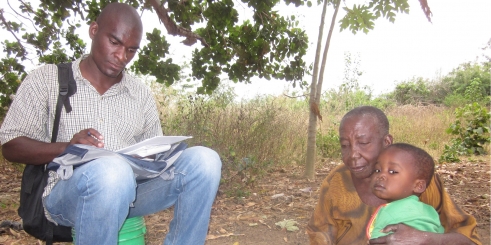
(c) Pascale Fritsch/HelpAge International
Older woman in rural Tanzania takes the RAM-OP survey
By Ben Small
HelpAge International has launched a low-cost, simple tool for assessing older people’s needs and vulnerabilities in the event of a humanitarian crisis.
The Rapid Assessment Method for Older People (RAM-OP) is a house-to-house survey carried out by a small group of trained data collectors, assessing older men and women, asking about their diet, income, mobility, health and other needs.
This information is fed through data analysis software to inform humanitarian responses in the area.
What makes RAM-OP special?
Crucially, RAM-OP requires a sample of just 192 older people, where previous techniques have needed more than 600. This means the assessment can be carried out in just two weeks, including the training, data collection and entry, and analysis.
“We hope this method will contribute to a better understanding of older people’s requirements in humanitarian contexts,” said Dr Pascale Fritsch, Humanitarian Health and Nutrition Adviser at HelpAge International.
“We are now able to rapidly produce strong evidence on older people’s mental and physical health, on their nutrition and food security status, their diet, or their access to basic services.
“The method is designed to be used by all types of agencies, from national and international NGOs to governments or UN agencies, in humanitarian contexts but also in development settings.”
With funding from the Enhancing Learning and Research for Humanitarian Assistance (ELRHA) Humanitarian Innovation Fund, we worked with Valid International and Brixton Health to develop RAM-OP. We tested it out in a rural area of Tanzania and an urban area of Ethiopia’s capital Addis Ababa.
The results were positive, showing that the method is as effective, yet cheaper and quicker to implement, and encompassing a wide range of indicators.
Older people’s needs
Innovative solutions to humanitarian responses focused on older people are of paramount importance because of the group’s vulnerability and specific needs.
Older people may have particular dietary requirements or need access to nutrient-rich foods that are easily digestible if they have trouble chewing. Accessing distribution points for food and other essential items may also be difficult during times of emergency, and even if they can get there, getting those goods home presents another challenge.
In regards to health, older men and women often have ongoing medical needs that must be attended to by staff who understand these problems and in environments that are age-friendly. Disabilities are associated with age, and this can contribute to an older person’s vulnerability during a crisis.
RAM-OP webinar
You are invited to join a webinar about RAM-OP on 15 December, 12.45-1.45pm. Led by HelpAge Health and Nutrition Adviser Dr Pascale Fritsch, it will introduce the assessment method and focus on how it is used.
The RAM-OP tools
On our RAM-OP page, you can find a manual to guide users through the RAM-OP process, questionnaires and data entry files in English and French, data analysis software, and the tools to recruit and train data collectors. Everything is free and open source.
If you have any questions about RAM-OP please get in touch with with Dr Pascale Fritsch or Frances Stevenson.
Find out more:
-
Visit the RAM-OP page.
-
Read Dr Pascale Fritsch’s blogs about RAM-OP on the Humanitarian Innovation Fund website.
-
Explore our emergencies work and our technical guidelines.
